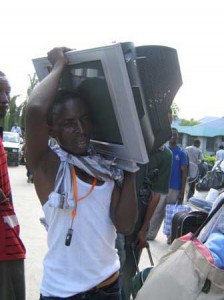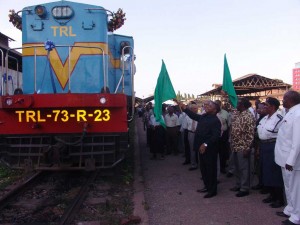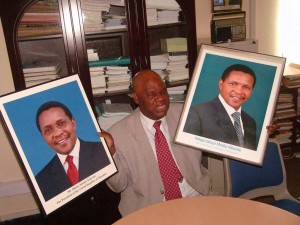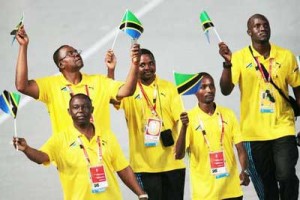An almost forgotten episode in Tanganyikan (and aviation) history was recalled by an auction in Shropshire on June 25 last year. Lot 42 was described as ‘the original Album of Captain F C Broome DFC covering the epic African Exploration Flight of January 1920 ……. including Broome’s original typed notes for his log of the flight.’ It sold for £700.
In 1919 there had been record-breaking flights across the Atlantic and to Australia by Vicars Vim aircraft and the South African government was keen to see a similar flight from London to Cape Town. Lord Northcliffe, owner of the Times newspaper, saw the chance of a scoop. On 4th February 1920 the Times announced in bold headlines that it was sponsoring a flight to Cape Town. This would not be a race, but a serious attempt to show ‘whether Africa can be traversed easily and safely from end-to-end by proper aircraft in ordinary conditions’.
The twin engined Vimy byplane, with two experienced RAF pilots (Captains Broome and Cockerel) and two mechanics on board, left England on 24th January and Broome’s logbook records their rather chequered progress. After leaving Brooklands aerodrome, he ‘nearly took the towers off Crystal Palace’; and having landed at Lyons to refuel, almost caused a strike by ‘asking for 600 gallons of juice’ on a Sunday night.
The plane also stopped at Naples, Malta, Tripoli and Benghazi and finally arrived at Cairo on 3rd February. There it was joined by Dr Charles Mitchell, Director of the London Zoo. who had been appointed Times Special Correspondent. Describing the hazards to be faced in Africa, the Times noted that the aircraft would fly along the east shore of Lake Victoria to avoid the ‘active volcanoes’ on the western shore which were ‘likely to cause atmospheric disturbances, which in their turn might bring about a forced landing among tribes addicted to cannibalism.’
On 5th February the Times revealed that another Vickers Vimy had set out from Brooklands aerodrome the previous day, piloted by two South Africans, Lieutenant Colonel van Ryneveld and Flight Lieutenant Brand. Their aircraft was imaginatively named ‘Silver Queen’.
The Times insisted that there was no race, noting that ‘it was of course never intended that the flight of the Times aero plane should be undertaken in a competitive spirit, but wholly for the purpose of scientific exploration and to test the route through Africa’. Nevertheless, Northcliffe wanted his plane to get to the Cape first.
The Times aircraft left Cairo on 6th February encouraged by a message from Queen Alexandra, and arrived at Khartoum on February 8th after two forced landings. It left Khartoum on February 10th but did not reach Jinja in Uganda until 22nd February. Repeated engine troubles caused more forced landings; adulterated fuel was probably to blame. Several nights were spent camping in the bush with ‘repose often disturbed by lions.’ Meanwhile Van Ryneveld was having his own problems. The Silver Queen crashed between Cairo and Khartoum and was damaged beyond repair. Undaunted, Van Ryneveld returned to Cairo and was lent a Vimey by the RAF. It was christened ‘Silver Queen II’. He left Cairo in the replacement plane on February 22nd After a refuelling stop at Mwanza the Times aircraft landed at Tabora on 26th February. They were greeted by a large crowd led by the Administrator of Tanganyika territory. Broome wrote: ‘Arrived Tabora cheerful. Thought worst part was over.’ But during take-off the next day the Vimy’s starboard engine cut out and the aircraft crash-landed in the scrub. It hit a large anthill and the impact forced the undercarriage into the lower wing. Fortunately none of those in board was injured but the plane was damaged beyond repair. Broome recorded: ‘All disgusted with rotten luck.’
Thus the Great African Exploration flight ended ignominiously on an ant hill.
Meanwhile ‘Silver Queen II’ reached Bulawayo, Southern Rhodesia where it to crashed on take-off. The South African Government promptly sent a two seater single engined de Havilland DH9 christened ‘Voortrekker’ as a replacement. Whether or not it was within the spirit of the competition for a different plane to complete the final leg of the journey the two pilots were greeted as heroes when they arrived at Cape Town on 20th March 1920. They were awarded a prize of £5,000 each by the South Africans and were knighted by King George V. In the best traditions of British sportsmanship, the Times commented that ‘while extending our deepest sympathy to Dr Chalmers Mitchell and his gallant companions for the great disappointment which befell them….. we feel that no one will join in our congratulations to Colonel van Ryneveld and Major brand more heartily than they’.
Postscript – The fuselage of the wrecked Vickers Vimy was taken over by the Tabora Sporting Club for use as a pavilion. Do any of our older readers remember it?
John Sankey




